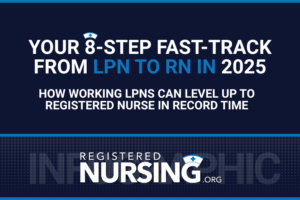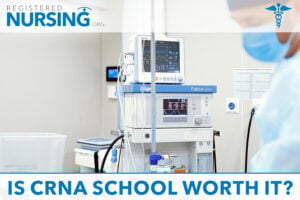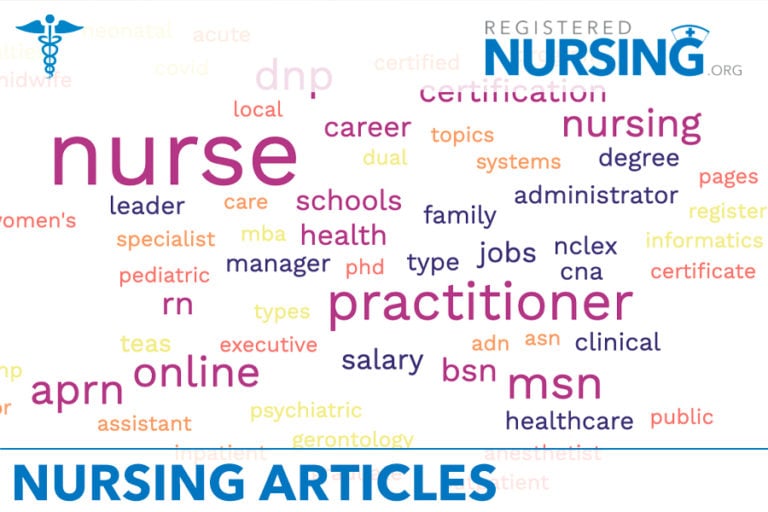Nursing Education Articles & Guides

11 Mins Read22 Jun 25
You already know your way around bedside care, medication passes, and patient rapport—that's the superpower of the Licensed Practical Nurse…

11 Mins Read16 Jun 25
The demand for Registered Nurses (RNs) in Florida is climbing rapidly, with the U.S. Bureau of Labor Statistics projecting a…

8 Mins Read12 Jun 25
The nursing profession offers numerous pathways for career advancement, but two commonly confused areas are “nurse educator” as a career…

8 Mins Read12 Jun 25
Finding the right nursing program can feel overwhelming, especially when you’re trying to balance location, cost, and program quality. Whether…

9 Mins Read10 Jun 25
In 2025, the demand for highly educated nurses continues to climb. According to the American Association of Colleges of Nursing…

12 Mins Read09 Jun 25
Nursing remains one of the fastest-growing professions in healthcare, with the U.S. Bureau of Labor Statistics projecting a 6% growth…

10 Mins Read06 Jun 25
As healthcare continues to evolve, so do the roles nurses play within the system. Advancements in technology, population health needs,…

7 Mins Read05 Jun 25
For registered nurses considering advanced practice careers, the question of whether CRNA school is worth the significant investment of time…

3 Mins Read04 Jun 25
Thinking about becoming a nurse and want a program that reflects your values? Faith based Accelerated BSN (ABSN) programs are…

3 Mins Read04 Jun 25
If you already have a bachelor's degree and are ready for a meaningful career shift, New York's Accelerated BSN (ABSN)…

11 Mins Read02 Jun 25
As the demand for registered nurses continues to grow across the country, Los Angeles has emerged as a dynamic center…
Nursing Careers & Specialties Articles & Guides

11 Mins Read13 Jun 25
Healthcare leadership offers diverse career opportunities, but two roles that often create confusion are nursing administrator and healthcare administrator positions.…

10 Mins Read06 Jun 25
As healthcare continues to evolve, so do the roles nurses play within the system. Advancements in technology, population health needs,…

9 Mins Read16 May 25
In today’s diverse healthcare landscape, the ability to communicate in multiple languages has evolved from a beneficial skill to an…

10 Mins Read05 May 25
The Advanced Practice Registered Nurse (APRN) Consensus Model is a regulatory framework designed to standardize how APRNs are educated, licensed,…

11 Mins Read02 May 25
Registered nurses looking to advance their careers, increase their earning potential, and specialize in areas they’re passionate about often turn…

11 Mins Read01 May 25
Private duty nursing is a growing and in-demand field offering a highly personalized approach to patient care. In 2025, as…

12 Mins Read25 Apr 25
California faces unique healthcare challenges that directly impact which nursing specialties are most critically needed throughout the state. From the…

9 Mins Read24 Apr 25
As the demand for qualified nurses continues to grow, so does the emphasis on patient safety, regulatory compliance, and workforce…

11 Mins Read21 Apr 25
In today’s dynamic healthcare landscape, nurses often need to secure licensure swiftly to meet urgent staffing demands. Whether you’re a…

11 Mins Read19 Apr 25
The United States is facing a critical and persistent shortage of registered nurses—a growing concern that significantly impacts patient care,…

11 Mins Read17 Apr 25
Registered nurses with extensive clinical experience and specialized knowledge possess valuable expertise that can significantly impact legal proceedings. As an…
Nursing Life Articles & Guides

10 Mins Read05 May 25
The Advanced Practice Registered Nurse (APRN) Consensus Model is a regulatory framework designed to standardize how APRNs are educated, licensed,…

11 Mins Read30 Apr 25
Working from home isn't just for tech professionals—nurses now have expanding opportunities to bring their clinical expertise into home-based roles.…

9 Mins Read24 Apr 25
As the demand for qualified nurses continues to grow, so does the emphasis on patient safety, regulatory compliance, and workforce…

12 Mins Read31 Mar 25
The United States continues to face a nationwide nursing shortage, and internationally educated nurses are helping bridge the gap. For…

8 Mins Read25 Feb 25
Retirement from nursing doesn't mean the end of professional fulfillment. Many retired registered nurses (RNs) find that they still have…

12 Mins Read03 Jan 24
What Is a Travel Nurse? A travel nurse is a registered nurse (RN) who accepts temporary assignments—usually lasting a few…

5 Mins Read29 Sep 23
After many opportunities and encouragement from your leadership team, you have decided to plunge into nursing leadership. Whether your first…

5 Mins Read19 Sep 23
The 24/7, 365 care delivery model is a reality for many nurse leaders. That's why I like to say that…

5 Mins Read19 Sep 23
Nurses and nurse leaders want to work "gigs." Sometimes, it's money the desire to try something new, and other times,…

4 Mins Read01 Sep 23
Truth bomb: My ADN program in the 1980s did not teach me ANYTHING about budgeting for a department. Aseptic technique…

5 Mins Read29 Aug 23
What is a mentor? If you search the internet, the first definition it pulls up simply states "an experienced and…
Nursing Articles & Guides Archives
2022 Articles
- NP, DNP, and Ph.D. in Nursing: How High-Level Nursing Salaries Compare to MD Salaries [Updated 2025]








